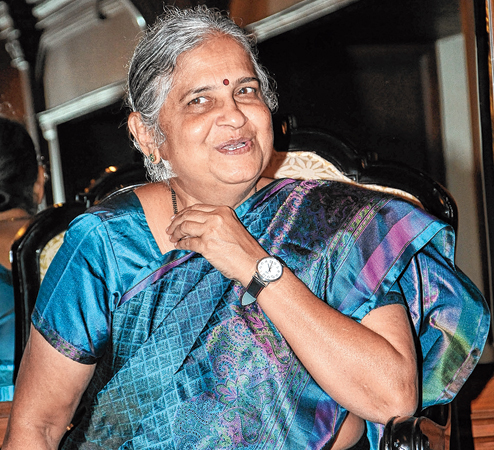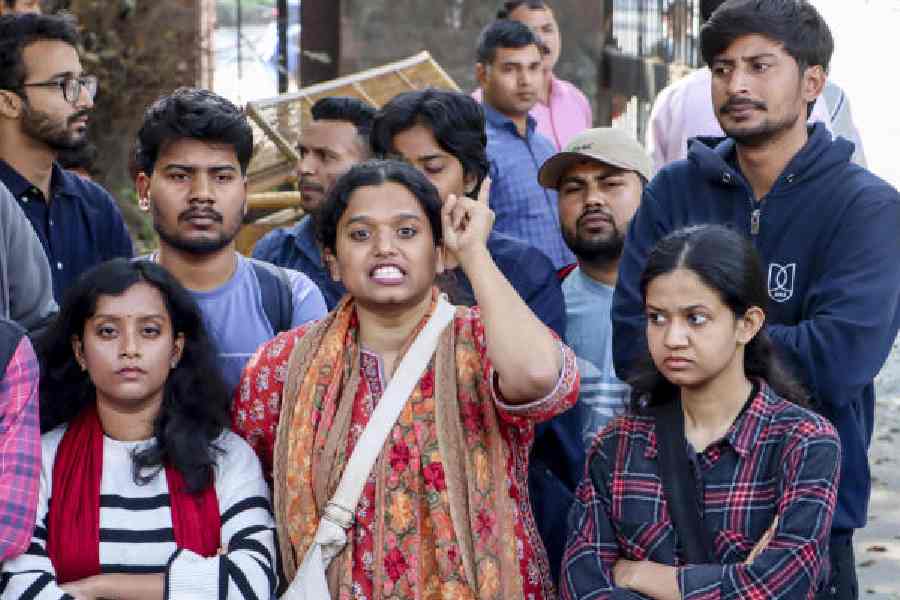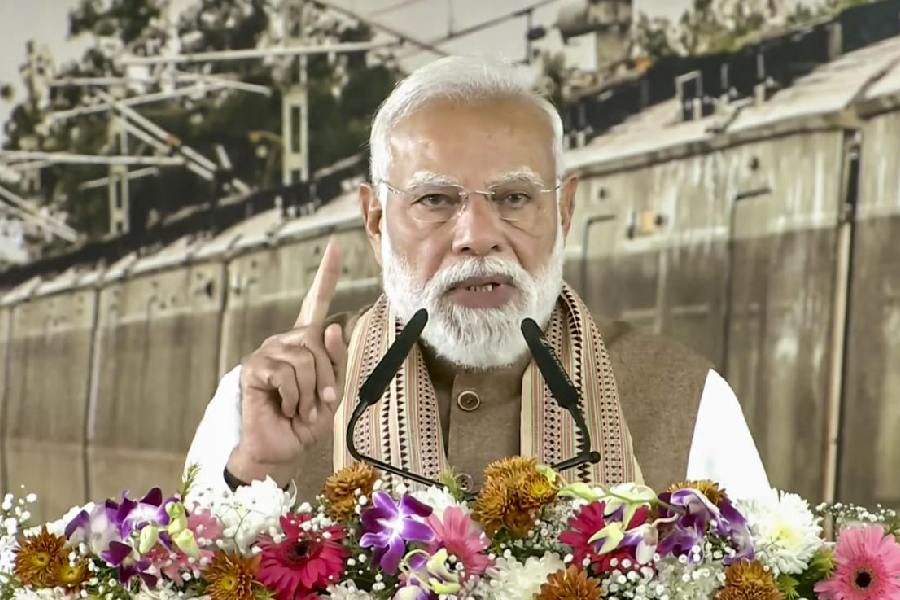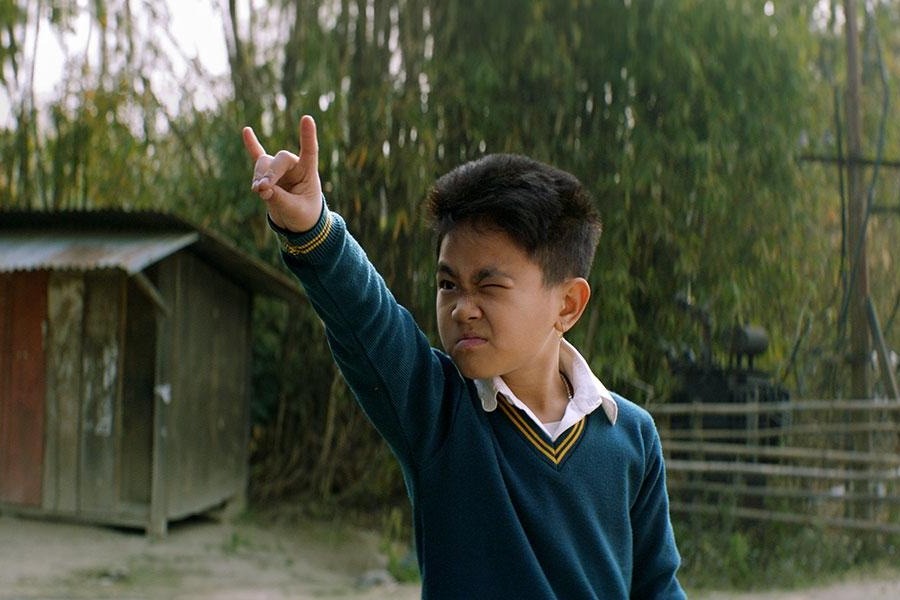
Sudha Murty and Malabika Sarkar (below) at An Author’s Afternoon at Taj Bengal

A teacher, a social worker, a wife, an author — Sudha Murty spoke about all these and the many more roles she juggles at An Author’s Afternoon, presented by Shree Cement at Taj Bengal, along with Prabha Khaitan Foundation and Jaipur-based literary consultancy, Siyahi. In conversation with Malabika Sarkar, former
vice-chancellor of Presidency University. Excerpts
Malabika Sarkar: You’ve written novels, short stories, travelogues, books for children, technical books — it’s a very wide range. How did you manage to do this? And considering the wide range of genres, is writing something you do as a kind of compulsion?
Sudha Murty: Firstly, I hope all of you can hear me. Because I am a teacher I am used to being loud. When I talk normally, my children ask me ‘Why are you raising your voice?’.
To begin, this is one city which likes literature. Unlike other cities. No other city in India has this kind of love for literature.
I started writing at a very young age, maybe 13. All of us as teenagers will write — something on melancholy, something on separation. I don’t know, 12 to 13 and then 14 to 18 you feel like suffering is a great thing. As a teenager, I also used to write but I never wrote poetry. My expression is through writing. Suppose I come across anything interesting I store it, I am a computer engineer so I have a computer background. Something I see, I like it, I store it. And when it comes to a level that I cannot store, then I start writing. And I empty it. Then again I store, layer by layer. Sometimes it takes almost two years. A novel takes three years for me because… I think about my characters every morning.
Technical books are easy to write because there’s no emotion in that — how a machine works, how the computer works, how this works and how that doesn’t work. That’s easy. Travelogues are also not that difficult because you see, you make notes, I make some notes wherever I go. But in olden days, I used to write travelogues. Today I don’t like to write them because you get everything on the Internet. Even technical books I don’t write nowadays because you don’t require a book. You go to the Internet, go to YouTube and repair a refrigerator…. I wrote nine novels actually… the first novel I wrote I think in 1979… I didn’t go to a publisher. I was worried nobody would publish novels, and nowadays, I don’t even feel like writing novels because in real life, there are situations which you cannot even imagine. And real life gives you inspiration.
Malabika: Was there anyone in your family who perhaps encouraged this side to your character?
Sudha: I come from a middle-class family, not a rich family. My father was a professor and doctor, and I married into another teacher family. My father-in-law was a schoolteacher and my brother is a professor, my sister’s a professor. The only odd man out in the family was (husband) Narayana Murthy, who went into business. I come from a family where teaching books is very, very essential. Until I graduated, the only gifts I received from my parents and grandparents were books. Never a sari or dress or anything else.
My grandfather being a schoolteacher and a great companion to me, the index of a person’s wealth was books. So when we were young and Narayana Murthy and I went to somebody’s house for dinner and Murthy said they are rich people.... I came back and said they are so poor. Murthy asked, ‘How do you say that?’ And I said they did not have any library at all in their home. To me every person should own a library, that is very essential….
It may be a very impractical way of thinking but that’s the way I grew up. It was very important to our family that you have to have your own library, however small it is. And we used to lend books among sisters and brothers and see that if I got one I should also lend one to read. That is the kind of company I grew up in and that helped me read a lot and that’s probably one of the reasons I started writing.
Malabika: You’re obviously a very independent person, very unusual in those days. Are there any incidents that you would like to share with us?
Sudha: I am a very independent person. In my time people would say, ‘my god being a girl she is like this!’ Today that’s not the case. My husband is Narayana Murthy —t-h-y, okay? I am Murty — t-y. From there I think my independence shows. I met Murthy long back. He was a good friend of mine. From the college days I knew him. So I used to tell Murthy, your surname is spelt wrong. He said my family’s surname is this and I shall continue like this…. And then when we decided to marry, I said Murthy, I am not convinced. Why should I be M-u-r-t-h-y? That’s the wrong spelling. But he was so happy that I was changing my surname, you know. I was hoping to continue with my maiden name, Kulkarni. Then my father objected. He said, ‘No. You are married to Narayana Murthy and you go for a dinner party.... how do you want to be called, Mrs Kulkarni? No, Mrs Kulkarni is my wife. You are not Mrs Kulkarni. Then you should be Mrs Murty.’
Logic, you know, so, I said okay. But still I was not convinced that t-h-y is the correct spelling of Murthy. So I made it M-u-r-t-y. Murthy uses t-h-y, I use t-y.
When my son grew up I said, ‘Beta, your father uses the wrong spelling. Even at the Murty Classical Library, I made it M-u-r-t-y. It’s not about spellings, it’s about what I believe. If it is legally, ethically right, I feel I should do it.
Somebody asked me how do you spend your time, when do you work? I say I don’t work at all, every day is a holiday for me. My work is so good that I don’t feel like I am going to work at all. Because what I do, it brings me great joy. Maybe I am very impractical when I say that.
I went to Nashik, where I delivered a lecture and one lady told me, Mrs Murty you are really an impractical lady. I said it is not bad to be impractical because it has proven good for me in my life. Marrying an unemployed man was an impractical thing.... But you don’t know how things change. Now I tell him to retire, okay? Whatever little money I saved in my work, entire money, plus Rs 250 I had kept for myself, Rs 10,000 I gave it to Narayana Murthy to start Infosys. It was a very impractical way. What guarantee was there that Infosys would be a success? No guarantee and I was impractical to give all my savings to him.
Then I left my very good career, very good engineering career, to help him and to raise two children. We could have hired a maid. But I didn’t want to do that. Money doesn’t matter to me. Because one shloka which was taught to me in my childhood... my grandfather was a great Sanskrit scholar and I had asked him why Krishna is respected so much in India. He said, ‘Na Rukmini vallabaha na Anirudh pitaha Na Devaki nandahara Krishnaha swayam Krishnaha’ — Krishna is respected not because he is Devaki’s son, Devakinandan, not because he was Rukmini’s husband, not because he was Aniruddh’s father but because he was Krishna in his own quality…. So I always believed what I am is what I am. If I can run a marathon of only 10 feet, that’s fine for me…. I am always happy to travel on my path however small it is.
Malabika: Has Mr Narayana Murthy been an influence on your creative writing? Does he listen to you read out? Do you talk to him about the stories that you’re writing about and take feedback?
Sudha: The most important thing is that I can write more because Narayana Murthy is on tour 200 days of the year! No, Mr Murthy is definitely not in any way connected to my literature. Being his wife I’ve had many privileges, many responsibilities also. Because of Murthy I’ve met many great people, I’ve been to many great places, and done many things because of Infosys Foundation….
Mr Murthy does not discuss. He is a very serious person, I’m a very humorous person. He is an introvert, I’m an extrovert. And he has great control over his tongue. He will not eat, he is very conscious about what he should not eat. Somebody asked me once how we survived in this marriage. I said, very simple. Opposite poles attract, it’s a law of physics. No, Mr Murthy is never a part of any of my creative journeys. It’s a lonely process which I enjoy. Me and my pen, my friend.
Malabika: You write so much about the predicament of middle-class Indian women. Do you think some things have remained the same or have things changed?
Sudha: In 15-20 years, things have changed a lot. I wrote my first novel in 1979-80. It was called Gently Falls the Bakula…. It has been translated into 13 languages. Suppose you tell me to write Gently Falls the Bakula now, I will write it in a different way because women have changed. They have changed after 1991-92, when the economy changed. Women have changed tremendously. Economically they have become strong, have become competitive, they are very assertive, with a lot of confidence. So, it’s no longer a woman-suffering world. Through Dollar Bahu, Mahasweta, we have seen how women have changed. They have transformed from traditional middle-class women to modern confident women.
Malabika: So is this part of the experiences you’ve had in life? You’ve been to different places, meeting all kinds of people...
Sudha: There are two ways I’ve seen the world. One is as a teacher. I teach in these crazy schedules, subjects like computer science and management. I told them I won’t accept any pay because the moment I do that, I have to correct papers. Because for me, everybody should pass. In real life, none of those things really matter. In real life what matters is how much you’ve grown as a person, what patience you have. These things we never teach our children.
Second thing is, you know, Infosys Foundation changed my life actually…. I have started travelling all over the world. I’ve lived in villages, I’ve worked with sex workers, I’ve worked with leprosy patients, HIV patients.... I have slept in their houses, slept on the platform, bus stops, everywhere. And then I realised what my country really is. I used to tell Mr Murthy, India does not need a software company, it does not mean India is progressing. What India really needs, my definition of a progressing society is that if a child can get three meals a day, clothes, study up to Class X, learn surviving job skills. That is my concept of India.
Poverty is not lack of wealth, it is the lack of confidence. You should build up that confidence. Some poor people have that confidence. Your achievements do not make you rich. It’s nothing to do with Padma Bhushan, Padma Shree, anything. You should do something for these people. And what those people think of you is ultimately what matters.

NANDITA PALCHOUDHURI (social entrepreneur): In your journey of life, has religion been important or do you separate it from the spiritual?
Sudha: I have always believed in God. I have never thought that whatever has happened in my life was planned. When Infosys was started, I never knew if it would take off. I never joined Infosys as a technical director but then I became the chairperson of the Infosys Foundation. I felt that it was probably God’s design that would help me touch lives. So I have always believed that we do not know what will happen. This age-old question of whether God exists or not depends on the individual. In times of crisis, I have always believed in God and have asked him to show me the way out of the crisis and to give me the courage.

K. MOHANCHANDRAN (Taj Bengal general manager): Everything is available online these days. In that context, what does teaching mean to you?
Sudha: In olden days, when people were teaching, the teacher was respected a lot, but out of fear. A teacher was respected for his/her knowledge and was considered to be the authority on knowledge. Today, when I teach, I consider my students better than me because they have a lot more knowledge than we do, thanks to the Internet. What is interesting is that nobody needs to request the teacher, everybody goes to the Internet and YouTube and they become your teachers. Then why do you require me? But YouTube or the Internet do not give you experience. The teacher can give you knowledge and experience, plus patience. For example, if I have a headache, it could be due to depression, because of a fight with my husband, a hundred reasons are there. Now, why do I need a doctor? I can go online and research and get all tests done. A good doctor will ask you questions and based on your history, will correlate that to your illness and then come to a conclusion. Similarly the role of a teacher is important because they come with experience and patience. No website can teach that.

RITA PUNWANI (vice-president, Ladies Study Group): You have taught lots of students. What did you impart to your own children that was different from what you taught your students?
Sudha: No, I never made a distinction between my children and my students. I tell my children ‘you can be open with me, we can have a conversation’. Every Friday we used to go and watch a movie. I tell my students often, ‘Beta, I taught you so many things in college — management decisions, risk analysis, database management etc, — which one of them was really useful to you in life?’ And they tell me, ‘Ma’am we don’t remember any of them. But we do remember your stories.’ These are stories I used to tell them in each class to teach them how to be patient etc. Each class would have one story. You should be role models for your children. What you want from your children, you should be like that.
“I like how the Author’s Afternoon series is not only getting more popular but it continues to retain its quality. Having Sudha Murty here with us was an honour!” said Sundeep Bhutoria of Prabha Khaitan Foundation.
“She is an inspiration. I’ve known Sudha and her daughter (Akshata) for several years now. I agree with everything she said, apart from two points. I think teachers, not only parents, have a great role to play in bringing up children. She also asks God to help her get through life and its hardships, but I say that God resides in us, so it is up to us to make our life better,” said Shamlu Dudeja, kantha revivalist.
“I was really inspired. I got carried away. I could relate to her. I have done a lot of things in my career that are similar to hers. I run my own organisation. I think a lot of things that she said made sense, especially the bit about finding ways to cross hurdles and negativity around us, and believing in oneself. I also liked what she said about parents being examples for their kids,” said Tanusree Shankar, dancer.
“I think she is an inspirational lady. I really admire her and loved the way she spoke. It was really beautiful!” said Agnimitra Paul, fashion designer.
“She has been so inspirational. We got to know so many aspects of her that we did not know before this chat. The insights she offered will certainly help me in my life,” said Nita Bajoria, aspiring author.
“The talk was amazing! I wish I had met her 25 years ago. It changed my life!” said Aban Desai, owner
of Millennium and Tejas gallery.










